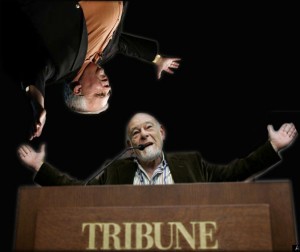
Randy Michaels / Sam Zell
I had intended to post about this last week, but dealing with some website stability issues, and then moving our site to a new host, kept me from getting this up. But the article series is so good and well researched that it deserves a look.
The Chicago Tribune practiced a bit of self-analysis last week, publishing a four-part series about its parent company’s bankruptcy and other misadventures that followed Sam Zell’s highly leveraged acquisition of the Tribune Company in 2007.
Tribune owns only one radio station, Chicago’s WGN-AM, and is more highly invested in other so-called “old” media: newspapers and television. While the story doesn’t fail to document how the precipitous decline in ad revenue didn’t make things any easier, the mountain of exotic debt used to leverage Zell’s purchase of the company is the primary culprit.
Of particular interest is part 4 of the series, which takes on the culture clash that happened at the company, especially as a result of Zell installing ex-Clear Channel chief Randy Michaels as the CEO of Tribune.
Michaels, one might recall, was the mastermind of Jacor, which launched the careers of Rush Limbaugh and Dr. Laura, and was financed by Zell. Jacor would then get acquired by Clear Channel, putting Michaels in charge of its acquire-and-liquidate strategy to build up its empire that once counted some 1200 stations.
The article titled, “Culture Shock,” documents just how poor a fit Michaels and his cronies were with the culture and legacy of Tribune, observing,
“Instead of fostering innovation among current employees, Michaels brought in a coterie of his colleagues from the radio industry who could not deliver the innovative breakthroughs the company needed. In short, Zell and Michaels never bothered to understand the workplace they were trying to remake, which should be job one in corporate culture change.”
Less than a year after Michaels took over as CEO, he resigned, in October 2010 . This happened after New York Times media correspondent David Carr reported how Michaels was running the company headquarters like an 80s teen comedy frathouse, full of “sexual innuendo, poisonous workplace banter and profane invective.”
It does not appear to be a coincidence at all how the article’s characterization of Michaels’ entrance at Tribune also applies to his next misadventure:
“What happened next could be seen as a case study of how to squander an opportunity at reinvention.”
After taking his leave from Tribune Michaels started a new radio company, Merlin Media, buying up stations in Chicago and New York City. His highly touted, but ill-conceived, “FM News” experiment in both cities came to a close this past July, after both stations sank to the bottom of the ratings.


